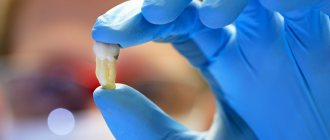The combined drug Novigan quickly eliminates the painful symptoms of algomenorrhea, colic in the stomach and abdominal cavity, and can be used for fever and migraines. The formula of the drug provides improved well-being with cramps, elevated body temperature, and headaches of various origins.
Composition, dosage form
Novigan is available in the form of tablets for oral use: film-coated, packaged in metallized blisters. Each pill contains:
- ibuprofen: 0.4 g;
- fenpiverinium bromide: 0.005 g;
- pitofenone: 0.1 g.
Auxiliary compounds that stabilize the state of the drug and give it shape:
- glycerol;
- talc;
- starch;
- magnesium stearate;
- polysorbate and others.
The secondary cardboard packaging of the medicine contains from 2 to 10 blisters with tablets and detailed instructions included.
The mechanism of action of the drug Novigan
Novigan tablets effectively relieve various types of pain and physical discomfort. The drug is used as an analgesic, antispasmodic and anti-inflammatory. Ibuprofen in its composition provides a blockade of prostaglandins, including those in the peripheral nervous system and tissues of internal organs. At the same time, the substance affects the thermoregulation center, reducing fever and associated discomfort.
Pitophenone hydrochloride is a myotropic antispasmodic that relaxes smooth muscle fibers. Its use helps relieve painful contractions of vascular walls and cavitary organs. Fenpiverinium bromide complements and prolongs its action, having an anticholinergic effect.
The tablet shell quickly dissolves in the stomach cavity, the active substances are absorbed into the blood and distributed in the body fluids, partially binding to plasma proteins. The maximum concentration is usually achieved within 1 hour, and the pharmacological effect develops within 15–20 minutes after administration. The drug is transformed by liver cells, metabolites leave the body along with urine. Residues of the drug remain in tissues and blood for no more than 12 hours.
Novigan has a symptomatic effect, reducing the painful manifestations of pathological conditions. It does not affect the course and causes of chronic diseases.
Novigan, 400 mg+5 mg+0.1 mg, film-coated tablets, 10 pcs.
In recommended doses, Novigan ® does not cause side effects.
From the gastrointestinal tract: NSAID gastropathy (abdominal pain, nausea, vomiting, heartburn, loss of appetite, diarrhea, flatulence, constipation; ulceration of the mucous membrane of the gastrointestinal tract, which in some cases are complicated by perforation and bleeding; irritation or dryness of the mucous membrane membranes of the oral cavity, pain in the mouth, ulceration of the gum mucosa, aphthous stomatitis, pancreatitis.
From the hepatobiliary system: hepatitis.
From the respiratory system: shortness of breath, bronchospasm.
From the senses: hearing impairment: hearing loss, ringing or tinnitus; visual impairment: toxic damage to the optic nerve, blurred visual perception, scotoma, dryness and irritation of the eyes, swelling of the conjunctiva and eyelids (allergic origin), accommodation paresis.
From the central and peripheral nervous system: headache, dizziness, insomnia, anxiety, nervousness and irritability, psychomotor agitation, drowsiness, depression, confusion, hallucinations, aseptic meningitis (more often in patients with autoimmune diseases).
From the cardiovascular system: heart failure, tachycardia, increased blood pressure.
From the urinary system: acute renal failure, allergic nephritis, nephrotic syndrome (edema), oliguria, anuria, polyuria, proteinuria, cystitis, red staining of urine.
Allergic reactions: skin rash (usually erythematous or urticaria), pruritus, angioedema, anaphylactoid reactions, anaphylactic shock, bronchospasm or dyspnea, fever, erythema multiforme exudative (including Stevens-Johnson syndrome), toxic epidermal necrolysis (Lyell's syndrome ), eosinophilia, allergic rhinitis.
From the hematopoietic organs: anemia (including hemolytic, aplastic), thrombocytopenia and thrombocytopenic purpura, agranulocytosis, leukopenia.
Other: increased or decreased sweating.
From the laboratory parameters: bleeding time (may increase), serum glucose concentration (may decrease), creatinine clearance (may decrease), hematocrit or hemoglobin (may decrease), serum creatinine concentration (may increase), liver transaminase activity ( may increase).
If the drug causes a change in your usual condition, stop taking it and call your doctor immediately.
Indications for use
It is recommended to take Novigan for any pain syndrome, including those accompanied by spasms or colic:
- for painful menstruation: active components significantly reduce the production of prostaglandins in the female myometrium, relieve pressure in the vessels of the uterus and appendages, help get rid of cramping attacks before the start of the cycle and throughout menstruation;
- with inflammatory processes in the pelvic and abdominal organs: adnexitis, renal colic, pain in the liver, intestines, gall bladder;
- with cystitis;
- for tension headaches caused by poor circulation due to cervical osteochondrosis, for migraines, and meteosensitivity;
- with myositis;
- with neuralgic syndrome;
- for inflammation and degenerative processes in the joints and spine: arthritis, osteoarthrosis, sciatica, lumbodynia;
- for mechanical injuries of joint structures and muscles: bruises, pinching, dislocations, sprains and torn ligaments;
- during the recovery period after surgical interventions.
If necessary, Novigan can be used to relieve toothache. Ibuprofen in its composition reduces the sensitivity of nerves, reducing unpleasant symptoms.
15% of women suffer from endometriosis
Endometriosis occurs when cells from the endometrium (the lining of the uterus) extend beyond the uterine cavity, become attached and begin to grow in other organs. They go through the same monthly cycle as normal endometrial cells, but cannot leave the body as they do during menstruation. This causes inflammation and further formation of scar tissue in the affected areas. And where there is inflammation, there is pain! And, unfortunately, not only pain...
Fact #1
Endometriosis cannot be cured
This sounds harsh, I don’t want to believe it, but today it is true. However, there is good news: the disease can be “curbed”, as a result you can have a good quality of life and avoid infertility, premature menopause, etc.
This is why endometriosis requires long-term treatment, right up to menopause. Even if the disease is incurable, this does not mean that from now on it controls your life. Only a gynecologist can choose the right treatment and develop tactics for managing your condition with endometriosis.
Fact #2
Endometriosis is not easy suffering during menstruation
Endometriosis can significantly affect work ability and overall quality of life, creating problems during the childbearing period, one of which is infertility (more than half of women suffer from this), and can sometimes continue even after menopause.
Fact #3
Pain can occur at any time, not just during menstruation
Pain can occur during urination, defecation, sexual intercourse (depending on the location of the lesions), and sometimes for no apparent reason at all. Sometimes you can predict when your pain will be worse, but endometriosis is usually unpredictable.
Fact #4
Diagnosing endometriosis is not easy
The time from the onset of symptoms to diagnosis can take up to 8 years or more. Women turn to different specialists who make different diagnoses. And often, to relieve pain during menstruation, without a thorough questioning and examination of the patient, painkillers are prescribed, which can mask the symptoms for many years, while the disease progresses.
Fact #5
Endometriosis affects both the physical and mental state of a woman
Pain itself can be the reason for missing work or school, your refusal to engage in social activities, or your avoidance of sexual contacts. Irritability, anxiety, depression, even depression are quite common phenomena in patients with endometriosis.
Fact #6
Endometriosis can affect every woman differently
Even if you find two women with endometriosis in the same places, the likelihood that they will experience the same symptoms is relatively small. Almost all women will experience pain, but its nature and location may differ significantly. Stage I (mild) endometriosis may cause more pain than stage IV (extensive) endometriosis.
Fact No. 7
There is no one-size-fits-all treatment or even combination of treatments that will work for all patients
Treatment is always individualized. For treatment, surgical intervention is used, as well as drug treatment - hormonal drugs and drugs that affect the production of hormones (gonadotropin-releasing hormone agonists)
Fact #8
With endometriosis, the main hormones of femininity - estrogens, work against us
Estrogens normally promote endometrial growth at the beginning of each menstrual cycle. However, with endometriosis, estrogens cause the progression of the disease, because regardless of which organ the cells of the inner lining of the uterus “take root”, they also respond to estrogens, like normal tissue. Therefore, hormonal drugs for the treatment of endometriosis should not contain estrogens.
Fact #9
After childbirth, endometriosis is not cured and may even progress
There is a misconception that pregnancy and childbirth can, if not cure, then at least cause regression of the disease. Alas, this is not true. Endometriosis can progress after childbirth. However, childbirth saves you from something else - it is a powerful prevention of ovarian cancer, the risk of which increases with endometriosis.
Fact #10
You can't stand the pain
Patience and perseverance are inappropriate here. If pain is not stopped in time, it can become chronic: in this case, nerve cells are damaged and perceive pain more acutely. That is, pain sensitivity in general increases: you will feel any pain, even toothache and headache, more acutely than women who do not suffer from endometriosis.
Contraindications
The use of the drug is prohibited for the following health conditions:
- bronchial asthma;
- hypersensitivity to acetylsalicylic acid and other NSAIDs;
- for disorders of blood coagulation and composition, pathologies of the hematopoietic organs;
- for diseases and dystrophy of the optic nerve, glaucoma;
- gastric ulcer, acute colitis, pancreatitis, gastritis, erosive lesions of the gastrointestinal mucosa;
- with a tendency to internal bleeding;
- in the period after heart surgery, with acute cardiac arrhythmias.
Novigan is also not applicable in the early stages of pregnancy - in the first trimester, and in the last month before childbirth. It is contraindicated for nursing women and children under 14 years of age.
The drug is prescribed with caution to the elderly, patients with diabetes mellitus, angina pectoris, hypertension, renal or liver failure.
Hormonal treatment for endometriosis.
Hormones for endometriosis are an almost obligatory part of treatment. This is physiologically justified, because the disease is hormone-dependent. Its main reason is the excessive production of estrogen in a woman’s body.
The doctor prescribes hormonal treatment for endometriosis to solve the following problems:
- normalization of the secretory activity of the ovaries and pituitary gland;
- prevention of further proliferation of endometrioid tissue.
Artificial suppression of menstruation is the essence of hormone therapy. Under the influence of active substances, physiological rejection of the uterine mucosa does not occur. Foci of its growth outside the uterus do not bleed, and the body recovers.
Other treatments include:
- Simulating menopause. The doctor prescribes hormonal drugs that reduce the level of sex hormones to minimum values.
- Suppression of ovulation. For this purpose, medications that contain synthetic androgens (male sex hormones) are used. These substances block the release of a mature egg from the follicle.
Drug treatment of endometriosis includes several groups of hormonal drugs. The doctor selects a treatment regimen individually, taking into account a number of factors:
- individual characteristics of a woman’s body;
- the patient’s desire to have children in the future;
- presence of contraindications.
It is difficult to cure endometriosis without hormones. Alternative treatment can only be considered as an additional treatment. Its effectiveness is difficult to predict. Further development of the disease and relapse cannot be ruled out.
Hormonal oral contraceptives for endometriosis.
Before determining a treatment regimen, the attending physician prescribes tests to determine which hormones are elevated. Each group of drugs for the treatment of a disease has a different pharmacological effect, so self-medication is unacceptable. The decision on conservative treatment or surgery is made only by a qualified specialist.
Advantages and disadvantages of hormonal treatment for endometriosis
The effectiveness of drugs for endometriosis depends on the stage of development of the disease. The highest therapeutic effect is observed at the initial stages of development of the pathological process. Early detection of pathology helps to avoid surgical intervention. The advantages of this treatment are:
- pain relief;
- stopping bleeding;
- restoration of reproductive function.
Along with the therapeutic effect, hormonal pills for endometriosis have a contraceptive effect. They are prescribed to women in the later stages of the disease as preoperative preparation and during the rehabilitation period. After a course of therapy, the woman’s body quickly recovers: the menstrual cycle normalizes and fertility is preserved.
Hormone treatment, like any other, has disadvantages:
- lack of therapeutic effect if the cause of endometriosis is not associated with an increased level of estrogen in the woman’s blood;
- duration of therapy (from 6 to 12 months);
- drug dependence may develop;
- Do not skip taking medications, otherwise breakthrough bleeding will occur;
- after discontinuation of drugs there is a risk of relapse.
With long-term use of hormones, a woman develops adverse reactions. The most common ones include:
- nausea;
- headache;
- violation of metabolic processes;
- depression;
- dysfunction of the circulatory and digestive systems.
Contraindications to hormone treatment
Not all patients are prescribed hormonal therapy. This method of conservative treatment of endometriosis has contraindications:
- endocrine disorders;
- renal and hepatic dysfunction;
- pathologies of the heart, blood vessels, hematopoiesis;
- diabetes;
- stomach ulcer, gastritis;
- tendency to allergies;
- hypersensitivity to individual components of drugs.
It is not advisable for women who are obese or smokers to take hormones. Contraindications include pregnancy, lactation, and the presence of cancer.
Treatment of endometriosis with hormonal drugs is the most effective way. There are various groups of medications that are prescribed to combat the disease. The drug therapy regimen is selected only by the doctor.
Based on materials from https://gormonal.ru
Side effects
While taking the drug, reactions from the gastrointestinal tract and nervous system are possible:
- loss of appetite, dry mouth, unpleasant taste, nausea, epigastric pain;
- dizziness, insomnia or increased drowsiness;
- decreased urine volume;
- increased sweating;
- visual disturbances;
- increased level of leukocytes in the blood, decreased clotting;
- bronchospasm;
- tachycardia, increased blood pressure.
Possible signs of an allergy to the drug: swelling of the mucous membranes of the eyes and eyelids, lacrimation, urticaria, itching, aphthous stomatitis, vasomotor rhinitis, laryngeal edema. In such cases, immediate discontinuation of the medication is required.
Dental treatment during pregnancy
Timely dental treatment during pregnancy is a guarantee of peace of mind and the absence of unnecessary emotional worries. Toothache itself is unpleasant and causes some discomfort. And toothache during pregnancy is doubly unpleasant, as it puts extra emotional stress on the pregnant woman and her unborn child.
Pregnant women are susceptible to a number of oral diseases that can develop during pregnancy due to a lack of beneficial microelements and insufficient oral hygiene. These are the diseases.
- Gingivitis is inflammation of the gums. Accompanied by a feeling of itching in the gums, pain when eating, and then bleeding. Treatment of gingivitis must be carried out necessarily, since if the disease is ignored, gingivitis quickly “flows” into periodontitis.
- Periodontitis is a complex inflammation of the tissues surrounding the tooth. Characterized by the formation of gum pockets and loose teeth. Periodontitis can result in tooth loss. Periodontitis is dangerous for the proper development of dental tissues in an unborn child, so treatment of this disease is mandatory.
- Caries. During pregnancy, the expectant mother's teeth are very susceptible to harmful bacteria, so caries develops at a rapid pace. Untreated caries can be passed on to the baby, so you need to see a dentist. In this case, dental treatment during pregnancy is mandatory.
- General weakening of gums and teeth. Due to a lack of vitamins and microelements, pregnant women experience weakening of tooth enamel, acute tooth sensitivity and bleeding gums when exposed to mechanical stress. In such cases, again, it is necessary to consult a dentist to exclude the possibility of developing oral diseases.
How to use Novigan: instructions
It is recommended to take the drug in short courses: no more than 5 days in a row. The maximum dose of tablets is 3 pieces: 1 three times a day. If well tolerated, Novigan can be taken between meals: 2–3 hours after meals or 1 hour before meals. If you have stomach problems, it is not advisable to take the tablets on an empty stomach. It is safer to take them with food.
Treatment should not be combined with taking tranquilizers, other NSAIDs, drinking alcohol or caffeine-containing products. This may increase side effects and cause intoxication.
Novigan
The Indian drug Novigan (ibuprofen + pitofenone hydrochloride + fenpiverinium bromide) is a combined analgesic and antispasmodic drug used for pain syndromes of various etiologies, incl. - for headaches. One of the main tasks of doctors for chronic headaches and pain syndromes of other localization is to choose the optimal drug in a given situation, which, at the same time as being highly effective, would also have a favorable safety profile for single and long-term use. Nonsteroidal anti-inflammatory drugs (NSAIDs) are among the most commonly used drugs to treat pain-related conditions. Recently, the arsenal of NSAIDs has been significantly updated. Combination drugs have appeared on pharmacy shelves, containing, in addition to NSAIDs, two or even three more pharmacologically friendly components. One of the most promising NSAID-containing painkillers is the drug Novigan. It contains the NSAID ibuprofen, the peripheral papaverine-like antispasmodic pitofenone hydrochloride and the mixed (central and peripheral) anticholinergic action fenpiverinium bromide. All active ingredients of Novigan are endowed with different mechanisms of action and enhance the analgesic and antispasmodic effects of each other. Ibuprofen, like other NSAIDs, inhibits the synthesis of prostaglandins, mediators of pain and inflammation. Its anti-inflammatory effect is also realized by stabilizing the cell membrane and specific proteins, suppressing the processes of leukocyte adhesion and phagocytosis, and inhibiting the production of free radicals. The analgesic effect of ibuprofen is stronger than that of propoxyphene and acetylsalicylic acid. In patients with primary dysmenorrhea (menstrual pain in the absence of organic pathology of the genital organs), ibuprofen, by reducing the concentration of prostaglandins in the uterus, reduces intrauterine pressure and its excess tone. In addition, ibuprofen inhibits the formation of thromboxane, which promotes platelet aggregation (sticking together).
Pitophenone hydrochloride, being a papaverine-like substance, acts on the smooth muscle “framework” of the genital organs, promoting muscle relaxation. Fenpiverinium acts in conjunction with pitofenone hydrochloride, relaxing smooth muscles due to the blockade of m-cholinergic receptors. Novigan is quickly absorbed in the digestive tract. The maximum concentrations of active substances in the blood plasma are observed at 2 hours of the drug’s presence in the body. Novigan is excreted just as quickly (its half-life does not exceed 2 hours). If Novigan is taken after a meal, the rate and extent of its absorption is significantly reduced, but this has little effect on the bioavailability of the drug. Novigan is excreted in the urine (more than 90%), and the remainder in the bile. The drug should be taken 1 hour before or 3 hours after meals, and the second option should be considered more successful, because in this case, the irritating effect of ibuprofen on the gastric mucosa is neutralized. According to general recommendations, Novigan is taken 1 tablet up to 3 times a day, with 3 tablets being the maximum allowable dose. Novigan should not be taken for more than 5 days. A long-term medication course using Novigan is possible only under medical supervision, including monitoring of the blood picture and liver and kidney functions. To reduce the risk of negative side reactions from the gastrointestinal tract, Novigan should be taken in the minimum effective dosage. If symptoms of gastropathy appear, the patient should be referred for esophagogastroduodenoscopy and blood and stool tests. During treatment, alcohol consumption should be completely avoided. Concomitant use of Novigan with other NSAIDs increases the risk of side effects from the gastrointestinal tract. Caffeine potentiates the analgesic effect of the drug. When Novigan is used in recommended doses, it does not enter into clinically significant interactions with commonly used drugs.



